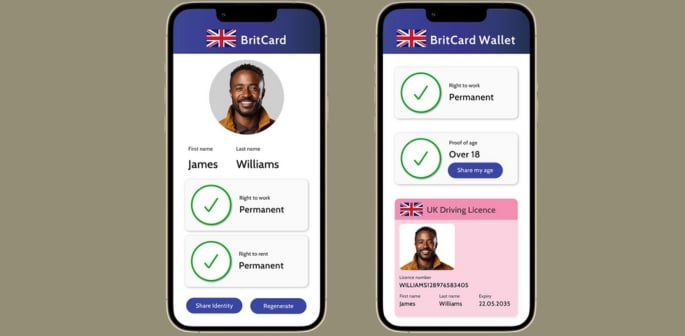“Digital ID is an enormous opportunity for the UK."
The government has revealed full details of a new digital ID scheme, which it says will help combat illegal working while making it easier for people to access vital services.
The so-called “Brit Card” will be mandatory for Right to Work checks by the end of this Parliament.
It will be available to all UK citizens and legal residents and stored on people’s phones, much like the NHS App or contactless payment cards.
Prime Minister Sir Keir Starmer said it will help strengthen border control.
How the Digital ID Will Work
The scheme will hold key details such as name, date of birth, nationality or residency status, and a photo for biometric security. The government has said it will serve as the authoritative proof of identity and residency in the UK.
There will be no requirement for individuals to carry the ID in daily life. However, it will be mandatory to prove the right to work. Officials say this will end the reliance on paper records, reduce fraud, and simplify checks for employers.
Prime Minister Keir Starmer said: “I know working people are worried about the level of illegal migration into this country.
“A secure border and controlled migration are reasonable demands, and this government is listening and delivering.
“Digital ID is an enormous opportunity for the UK. It will make it tougher to work illegally in this country, making our borders more secure.
“And it will also offer ordinary citizens countless benefits, like being able to prove your identity to access key services swiftly – rather than hunting around for an old utility bill.
“We are doing the hard graft to deliver a fairer Britain for those who want to see change, not division.”
“That is at the heart of our Plan for Change, which is focused on delivering for those who want to see their communities thrive again.”
What are the Benefits?
The government says the scheme will save time for individuals and businesses, streamlining access to driving licences, childcare, welfare, and tax records.
It will also form part of a GOV.UK digital wallet, sitting alongside a planned digital driving licence.
Officials argue it will stop people without the right to be in the UK from finding work, removing what ministers describe as one of the key “pull factors” for illegal migration.
The initiative builds on a 50% rise in arrests for illegal working under the government’s crackdown and follows deportations under the recent UK-France returns deal.
A streamlined digital system will help employers verify workers, tackle forged documents, and provide intelligence data on companies conducting checks.
This is intended to strengthen enforcement against businesses that knowingly employ illegal workers.
Security and Global Comparisons
The government has stressed that security will be central to the design.
Digital credentials will be stored on individuals’ devices, with state-of-the-art encryption and user authentication.
If a phone is lost or stolen, credentials can be revoked and reissued, which ministers say offers better protection than traditional physical documents.
The government says only the information relevant to a particular check will be shared, preserving privacy and limiting unnecessary data exposure. A consultation will consider whether additional details, such as address, should be included.
Officials point to other countries where digital IDs have transformed services.
In Estonia, parents can use IDs to access benefits and nursery places. In Denmark, students retrieve education records for applications.
In India, savings of $10 billion annually have been reported by reducing fraud in welfare schemes.
In Australia, citizens can use digital ID for banking and even buying alcohol.
Ensuring Accessibility
The government has promised that inclusion will be at the heart of the design.
A public consultation later this year will engage with groups such as the homeless, older people, and those less experienced with digital services.
Support will include outreach and face-to-face help for citizens who struggle with technology. Ministers say this approach will ensure no one is left behind.
While the government highlights benefits, critics remain concerned about privacy and civil liberties, with over half a million signing a petition.
Campaign groups have warned that a compulsory identification system could be “uniquely harmful” and might allow the state to collect and analyse personal data on a large scale.
As with other reforms in the Plan for Change, the success of digital ID will rest on how it balances border control and public service access with the need to protect freedoms and maintain trust.






























































